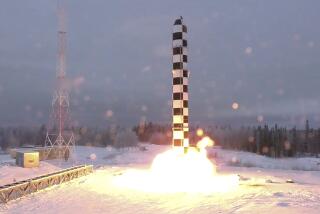U.S. Role Sought in Arms Control
NEW DELHI — The United States should again be a leader in arms control and disarmament and ratify a global test ban treaty to encourage other nuclear powers to do so, the former head of the U.N. weapons inspection team in Iraq said Saturday.
“U.S. ratification of a comprehensive test ban treaty would be likely to have a positive domino effect on China, India, Pakistan, Iran, Iraq and Israel,” said Hans Blix, who retired last year as the head of the U.N. agency that conducted the search for chemical and biological weapons in Iraq before the U.S.-led invasion. No such weapons have been found.
“It would make the development of new types of nuclear weapons much more difficult,” Blix said at a two-day conference on India’s growing political and economic role in the world.
Speaking on preventing nuclear weapons from falling into the hands of rogue states and terrorists, Blix said U.S. attempts to develop new types of nuclear weapons would not spur others to disarm and renounce weapons of mass destruction.
However, if Washington were to resume its leadership role in arms control and nuclear nonproliferation, it would be “greeted with enthusiasm by the whole world and could lead all away from weapons of mass destruction and toward greater security.”
Blix said Iran and North Korea would have to be offered incentives to give up their nuclear ambitions.
North Korea could be offered an attractive economic package that would help it move away from a communist system that had brought misery and starvation to its people, he said.
“The economic part of an agreement with Iran will need to cover trade and investment relations, perhaps support for WTO membership,” he said, referring to the World Trade Organization.
Apart from economic incentives, Iran and North Korea would have to be offered “guarantees about security against attacks from outside.”
Blix said solutions to the nuclear crises in both countries would have to be reached through talks.
“The war that was waged in Iraq is not a model that many want to see followed,” he said.
More to Read
Sign up for Essential California
The most important California stories and recommendations in your inbox every morning.
You may occasionally receive promotional content from the Los Angeles Times.










